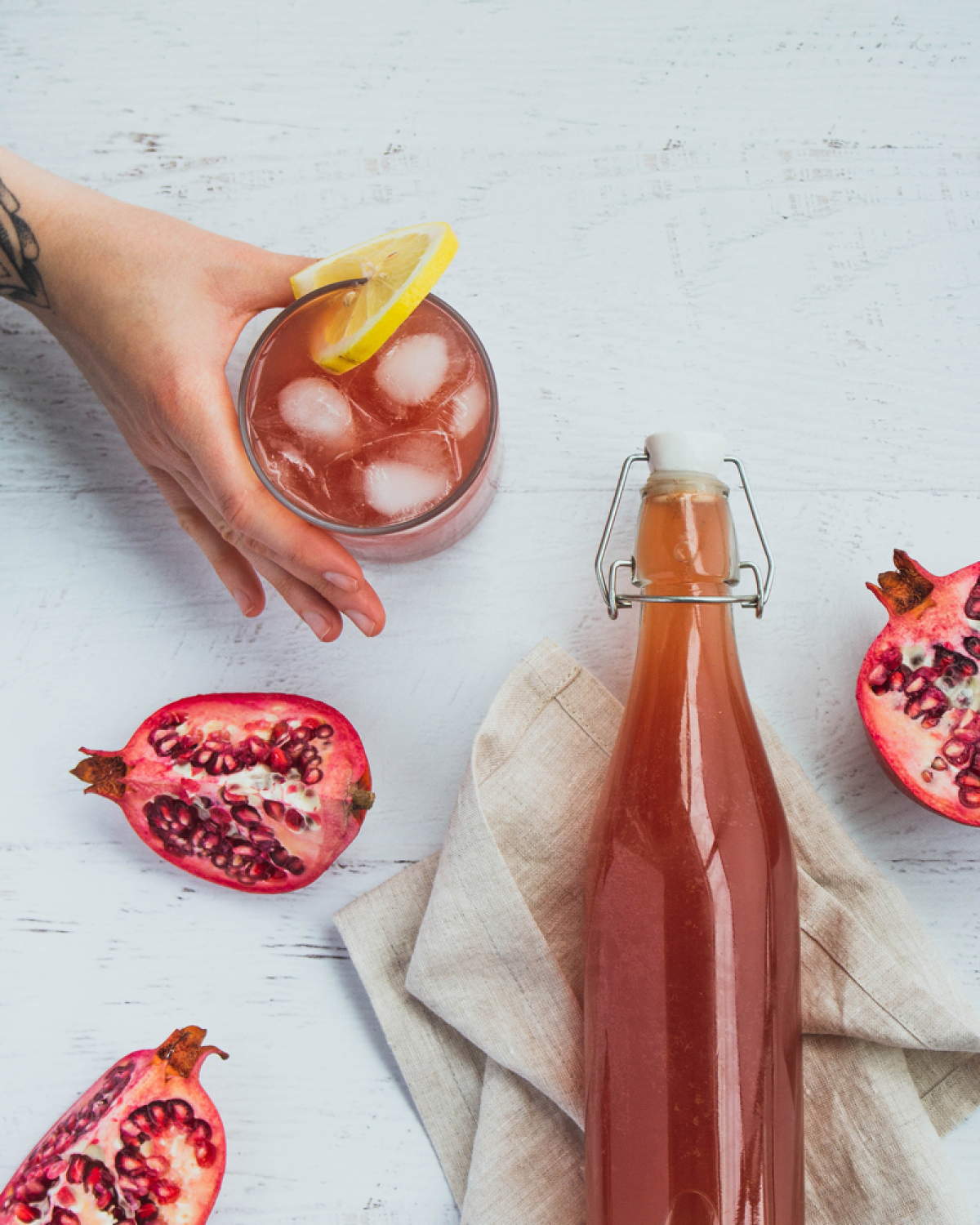Why Are Fermented Drinks In Fashion?
Fermented drinks are taking over shelves in supermarkets. Although it seems they appear there overnight, beverage fermentation is a practice going on for thousands of years. Now that many consumers want to harness the health benefits of fermented drinks, it is important to know what they are and how far their benefits can go. Continue reading to find out more about fermented drinks!
To receive the Luxiders newsletter, sign up here.
Numerous fermented drinks available today have roots in age-old traditions, holding esteemed positions in ancient cultures for their perceived healing properties. Now, there is a growing interest among consumers who seek the benefits that have been valued for generations. The distinctive tangy, sweet, and sour taste of fermented drinks sets them apart from traditional soft drinks. While this flavour profile may not immediately appeal to everyone, the market for fermented drinks is expanding. However, the journey of fermented drinks in the market has been fraught with challenges. Scepticism and overselling of their benefits have created a complex landscape. The increasing variety of fermented drinks entering the market, coupled with divergent perspectives, has made it challenging to discern their health merits. Here we dive into what fermented drinks are and what their actual benefits are.
A GUIDE TO FERMENTED DRINKS
There are a variety of fermented drinks, but they all share the same base: a liquid, a sugar source and something to break down the sugar. The beverages contain microorganisms that act like microscopic factories that break down sugars and transform it into the functional beverages we know. In fact, the fermentation process is like the one of beer and wine. However, the microorganisms used, the base ingredients, and the fermentation process itself differ, leading to unique flavour profiles and nutritional characteristics for each beverage.

©Alison Marras via Unsplash

©Shannon Nickerson via Unsplash
KOMBUCHA
Kombucha is a fizzy, sweet, and sour drink that undergoes fermentation of an infusion of sweetened black tea by introducing a starter culture referred to as a 'SCOBY' (Symbiotic Culture of Bacteria and Yeast). Depending on the process and ingredients, Kombucha can adopt many tastes including fruit-infused tastes. Kombucha retains valuable nutrients from tea like potassium, manganese, and vitamins E, K, and B. Like vinegar, kombucha is a great source of acids and amino-acids.
Kombucha stands out as one of the most recognised fermented beverages in today's market. It boasts a rich history with a long tradition of homemade preparation. Researchers trace its origin back to northeast China over two thousand years ago. Later, it found its way to Japan and Russia. In the 20th century, kombucha's influence extended to Europe and beyond through global trade routes. Referred as the “Tea of Immortality” or “The Elixir of Life '' in Traditional Chinese Medicine, the beverage sparked interest in modern consumers interested in the health benefits of Kombucha.
THE RISE AND FALL OF KOMBUCHA
Today, we can find Kombucha on shelves of numerous supermarkets, featuring diverse brands. The 21st-century resurgence of interest in this ancient beverage has followed a non-linear path, with perceptions in the marketplace shaped by a variety of media representations, leading to a somewhat varied reception. Consumers started to consume Kombucha, attracted by stories about its health benefits. As mentioned by Forbes, it was nicknamed the most ‘liberal’ product in 2009 for its popularity in alternative settings.
However, in 2010, a regulatory crisis hit the kombucha industry when Whole Foods removed kombucha products from its shelves due to elevated alcohol levels, violating the 0.5% ABV regulation. The crisis highlighted a lack of awareness among producers and regulators regarding alcohol development during kombucha's second fermentation, leading to a temporary suspension of production and distribution. Surprisingly, the crisis supported the future success of Kombucha.
The new regulations led to the development of standardised alcohol content tests and quality verification processes. Specifically, he formalisation of the product changed perspectives in the market. Forbes highlights that despite certain negative media portrayals, Kombucha thrived due to increased consumer awareness and interest in healthy soft drink alternatives. The dealcoholization of Kombucha helps consumers change their perspectives on the drink and embrace its positive benefits. Future Market Insights predicts that the Kombucha market will grow by 12% in the next few years.
OTHER FERMENTED DRINKS TO KEEP AN EYE ON
KEFIR
First, Kefir is a fermented milk beverage with a tangy taste and a thin yoghurt-like texture, crafted from kefir grains. It involves inoculating the milk of cows, goats, or sheep with kefir grains, which are gelatinous polysaccharides containing a culture of bacteria and yeast known as kefiran. Kefir is rich in protein and has valuable nutrients like calcium, phosphorus, and magnesium. It is also a great source of vitamin b12 and vitamin D. Kefir has less lactose than milk.
This centuries-old, fermented drink has its roots traced back to the Caucasus Mountains in Eastern Europe. The discovery of kefir is often credited to shepherds in the region who, unintentionally, facilitated fermentation by carrying milk in leather pouches, giving rise to the creation of this effervescent and tangy beverage. The term "kefir" is believed to have originated from the Turkish word "keyif," meaning "pleasure."
For a non-dairy option, consider trying water kefir. In this process, kefir grains ferment a sweet liquid, typically water with added sugar, resulting in a lightly carbonated beverage with diverse flavour notes.
TEPACHE
Tepache is a traditional Mexican fermented beverage crafted from pineapple peels, water, brown sugar, and an array of spices. Through a simple and rapid fermentation process, the pineapple peels transform into a tangy and sweet drink, offering diverse aromatic notes that can vary in preparation. Notably, the beverage often features pronounced hints of cinnamon and other sweet spices. Tepache is a refreshing drink enjoyed from street vendor carts to high-end restaurants. Its roots trace back to pre-Columbian Mexico, where it held significance in ancient cultures. The pineapple in tepache provides high contents of vitamin C. It also provides vitamin A, B, potassium and calcium. Tepache also has tibicos, great for revitalising hurt tissue.
KVASS
Next, Kvass or Kvazz is a northeast European drink with a cloudy, light brown appearance. It is found in Russian and Ukrainian homes and its popularity is taking it across the globe. The preparation process is simple. We toast dark sourdough rye bread, soak it in water, sweeten the infusion with sugar, and let the yeast do the rest. In one or two days, you have kvass ready to drink. It results in a sweet and sour drink that can adopt many flavours, but the earthy, bread taste is always present. As other probiotic drinks, kvass is great for constipation and helps reduce inflammation. It is also great for the brain since it is a source of neurological supportive vitamin B. The drink also helps us get extra minerals like iron, copper, manganese and magnesium. The phytonutrients also support liver health.
BOZA
Boza, also known as Bouza, Bosa, or Busa, is a lactic acid drink with a rich history spanning over 8,000 years in various Middle Eastern and Eastern European countries. The beverage has a thick and viscous consistency, and its colour can range from beige to light brown, depending on the preparation. While people commonly make boza from millet, they can also craft it from a variety of grains such as wheat, barley, and corn.
Furthermore, he flavour profile may include notes of cinnamon or clove, and individuals often adorn it with chickpeas on top. Boza has a sweet taste with mild acidic undertones.For individuals engaged in physical activity, Boza offers an excellent choice, serving as a valuable source of macronutrients by providing a substantial amount of protein and carbohydrates. The fermented drink also has 4 types of vitamin B, as well as good amounts of vitamins A, C, and E.

©Tyler Nix via Unsplash

©Anda Ambrosini via Unsplash
WHY TO INCLUDE FERMENTED DRINKS IN OUR DIET
A HEALTHY GUT
Chiefly, the combination of probiotics and prebiotics in fermented drinks can help us maintain a healthy gut. Probiotics, which are living microorganisms beneficial to the host when consumed in appropriate amounts, work alongside prebiotics—non-digestible fibres or compounds that act as a food source for beneficial gut bacteria. Research in Spain suggests that this combination maintains a diverse and healthy microbiome, a collection of good bacteria living in our bodies that are vital to our overall health. By fostering the growth and balance of beneficial bacteria, fermented drinks can potentially improve digestion and nutrient absorption.
OTHER HEALTH BENEFITS
Fermented drinks offer a wide array of health benefits, primarily through their antioxidative properties. These beverages are rich in polyphenols, antioxidants commonly found in tea and various substrates, and the fermentation process further amplifies their antioxidative effects. These antioxidants play a role in reducing blood pressure, preventing hypertension, and lowering cholesterol levels. In the case of kombucha, its polyphenols impede pancreatic lipase, resulting in decreased cholesterol levels and aiding in its excretion.
Additionally, researchers in Malaysia found that fermented drinks exhibit anti-inflammatory characteristics and contribute to immune system regulation. The remarkable anticancer, antimutagenic, antimicrobial, and antidiabetic effects of fermented drinks position them as promising contributors to comprehensive health and disease prevention. Finally, their involvement in detoxification, particularly in protecting the liver and blood, adds to overall well-being.
ARE FERMENTED DRINKS SAFE?
Mayo Clinic highlights that crafting kombucha in unclean conditions can encourage the growth of harmful bacteria, potentially leading to stomach upset, infections, or allergic reactions if not prepared correctly. Excessive consumption may also result in discomfort. While regulations limit the alcohol content to 0.5%, homemade variations may differ in alcohol content. Additionally, the nutritional composition varies by brand and preparation method. Therefore, we recommend choosing trusted fermented beverages that have undergone rigorous quality control. Regulated, well-prepared fermented drinks should pose no direct safety issue. Drinks with clear nutrition labels will provide clarity on the product's content. To prepare the drinks ourselves, we should familiarize ourselves with the basics of brewing, storage, and handling to minimize risks.
However, even when prepared correctly and without direct safety risks, fermented drinks may not deliver all the anticipated health benefits. Nutritionist Amy Keating told The Washington Post that certain strains of probiotics are effective in addressing specific health conditions like irritable bowel syndrome or traveller's diarrhoea. However, Keating explains that the full benefits of kombucha remain uncertain due to the variability in their formulations and the limited extent of research on their specific advantages. Mayo Clinic agrees that there are few medically valid studies on the benefits of kombucha for human health. In short, while experts do not dismiss the benefits of fermented drinks, there isn't sufficient evidence to attribute the observed improvements in health solely to the drink.
THE BOTTOM LINE
Fermented drinks have been integral to various traditions and cultures for millennia, and their enduring popularity is not without reason. While these beverages might not be the "elixir of life," they do offer notable benefits. While ongoing research continues to uncover the depth of advantages associated with fermented drinks, it's important to approach them without expecting them to cure illnesses and satisfy all our health needs. Instead, their primary merits lie in supporting a healthy gut and maintaining a balanced bacterial flora.
Ultimately, beyond their potential health benefits, fermented drinks present a flavourful and wholesome alternative to sugary soft drinks. Embracing fermented beverages as part of a balanced diet can contribute not only to physical well-being but also to a more varied and enjoyable palate.
+ Highlight Image:
© Milo McDowell via Unsplash
+ Words:
Francesco Witt
Luxiders Magazine




